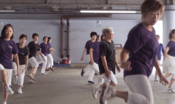article
Taking Mix It Up from Lunch to the Classroom
I lean against my classroom door, fielding questions about last night’s homework and passing out early morning hellos. I watch students disperse into their assigned first-period classes. As I steal a quick sip of my morning coffee, I find myself pausing at this thought: A supposedly unbiased computer system serendipitously placed our students into their respective classes, but is this all there is to mixing it up? No.

